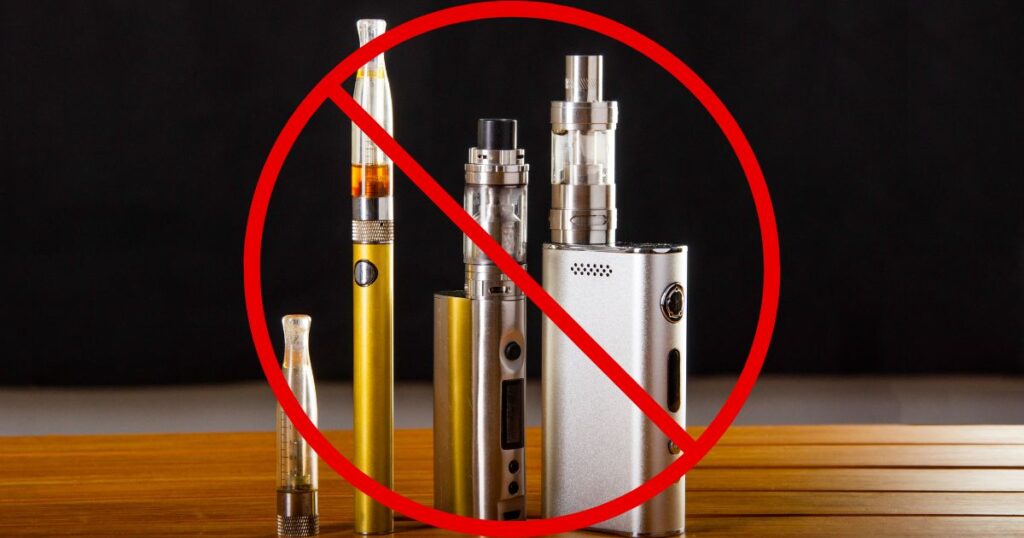Senate Bill 2024 officially took effect on Monday. September 1st, marking a significant shift in Texas cannabis regulation. The Texas vape ban under the new law prohibits the marketing, advertising, and sale of all vaping products containing hemp-derived cannabinoids, including THC, CBD, and Delta-8 compounds.
The legislation is one of the most restrictive vaping laws in the country, effectively eliminating most of the disposable vape market while targeting what lawmakers describe as a growing health crisis among Texas youth.
Senate Bill 2024
The bill amends existing health and safety codes to expand the definition of prohibited e-cigarette products. Under the new Texas vape ban, any substance intended for use in an e-cigarette device faces restrictions, regardless of whether it contains nicotine.
Key provisions of Senate Bill 2024 include prohibitions on vaping products that contain cannabinoids derived from hemp plants. This encompasses popular compounds like Delta-8, Delta-9 THC, and CBD that have been legally sold in Texas since hemp legalization in 2019. The Texas vape ban also covers vaping devices manufactured in China or other countries designated as ‘foreign adversaries’ of the United States.
Marketing restrictions extend to packaging and design elements that could appeal to minors. Vape products featuring cartoon characters, celebrity images, or designs resembling food items face prohibition under the new regulations. Additionally, devices designed to look like school supplies, smartphones, toys, or other everyday items are now illegal to sell.
Impact on Texas Cannabis Businesses
The legislation has created immediate challenges for cannabis retailers across the state. Many shops report that vaping products previously accounted for 30-40 percent of their total sales, creating significant financial strain as businesses adapt to the Texas vape ban.
Business owners have been forced to remove products from shelves and turn away customers seeking their preferred consumption method. Some retailers have managed to exchange their now-illegal inventory with suppliers, though not all suppliers offer such arrangements.
The law creates a Class A misdemeanor offense for violations, carrying penalties of up to one year in jail and fines reaching $4,000. Notably, while the sale and marketing of these products face criminal penalties, the law does not explicitly prohibit possession by consumers.
Legislative Background and Support
Senate Bill 2024 emerged from concerns from lawmakers about youth access to THC products, leading to the Texas vape ban.
The measure gained support as part of legislation initially focused on e-cigarettes disguised as common school items. Lawmakers expressed particular concern about small, discrete vaping devices that could be easily concealed and used by minors during school hours.
State Senator Charles Perry, the bill’s author, has been a consistent advocate for restricting Texas’s recreational cannabis industry. Perry previously authored legislation to ban all mind-altering cannabinoids, though Governor Abbott vetoed that measure and called for regulations instead of prohibition.
Enforcement and Industry Response
The Texas Department of State Health Services oversees enforcement and compliance with the new regulations. However, advocates worry that enforcement may vary significantly across different regions of the state.
Industry representatives have expressed concerns that the Texas vape ban could fuel illicit market activity as consumers seek alternatives to legally available products. Some business owners argue that eliminating regulated vaping options may push consumers toward potentially unsafe, unregulated alternatives.
Cannabis retailers are adapting by focusing on other legal consumption methods, including edibles, concentrates, and smokable hemp flower products that remain available under current Texas law.
Larger Cannabis Legislation Context
Senate Bill 2024 takes a more focused approach compared to other recent legislative efforts in Texas. Earlier this year, lawmakers considered Senate Bill 3, which would have banned nearly all THC products in the state. Governor Abbott vetoed that ban, stating a preference for regulation over prohibition.
The legislature has since approved Senate Bill 6 during a special session, which would ban most THC products in Texas. That measure currently awaits action in the Texas House, and its ultimate fate remains uncertain, along with whether Governor Abbott might veto such legislation again.

















